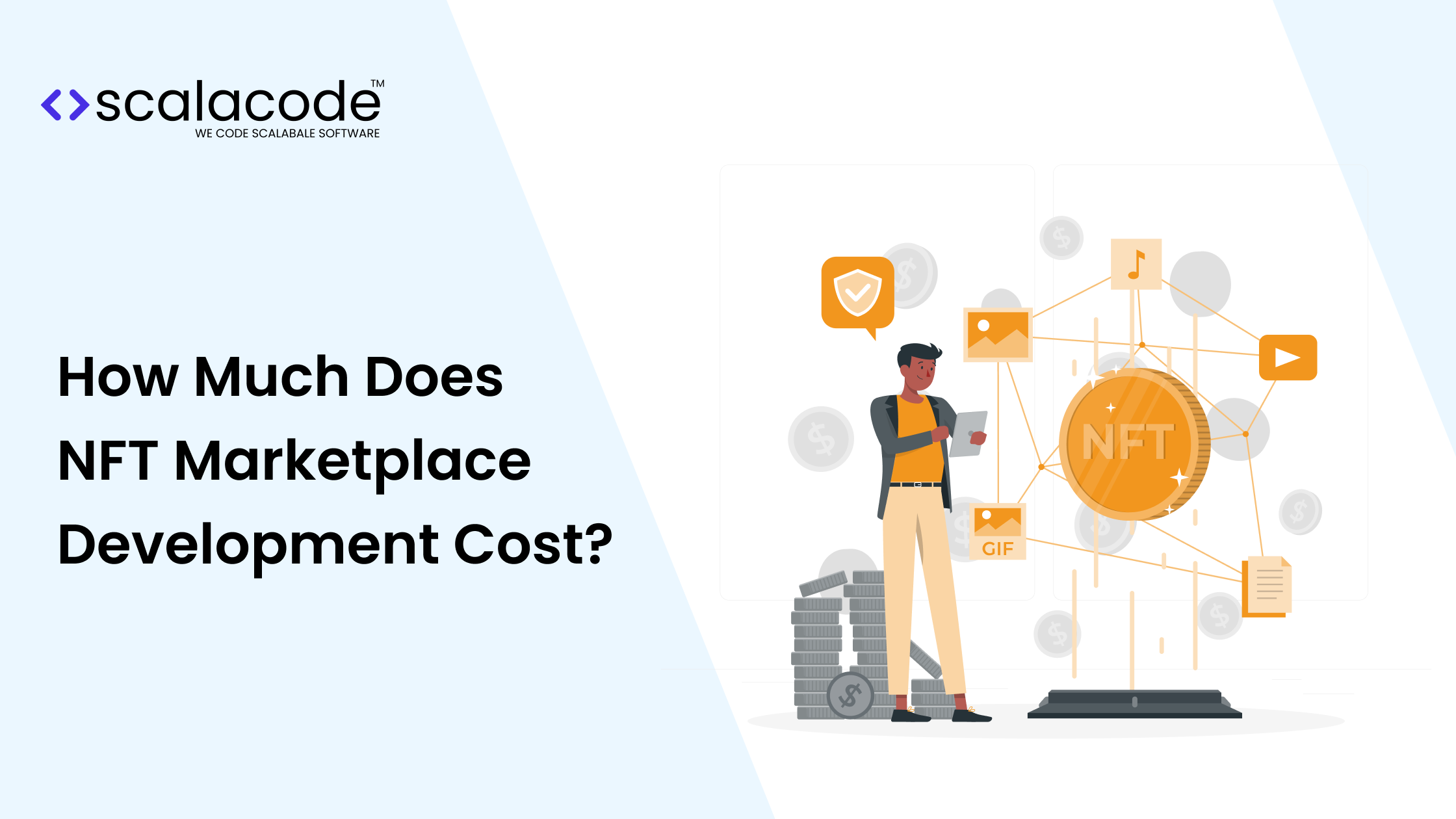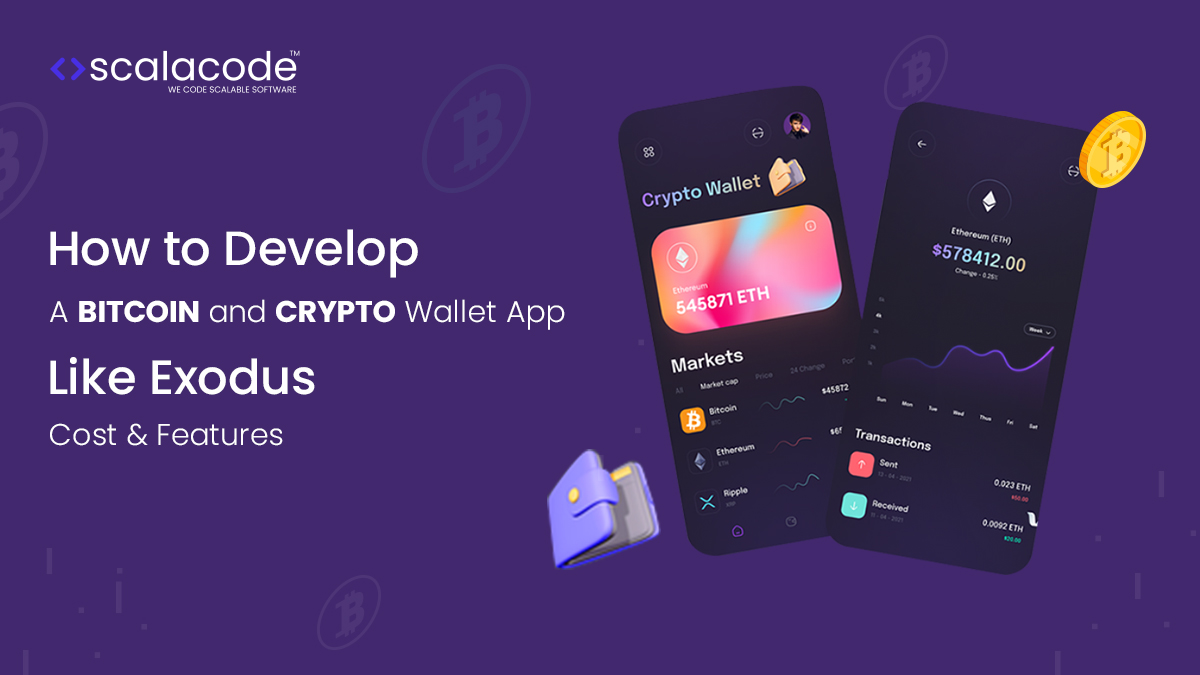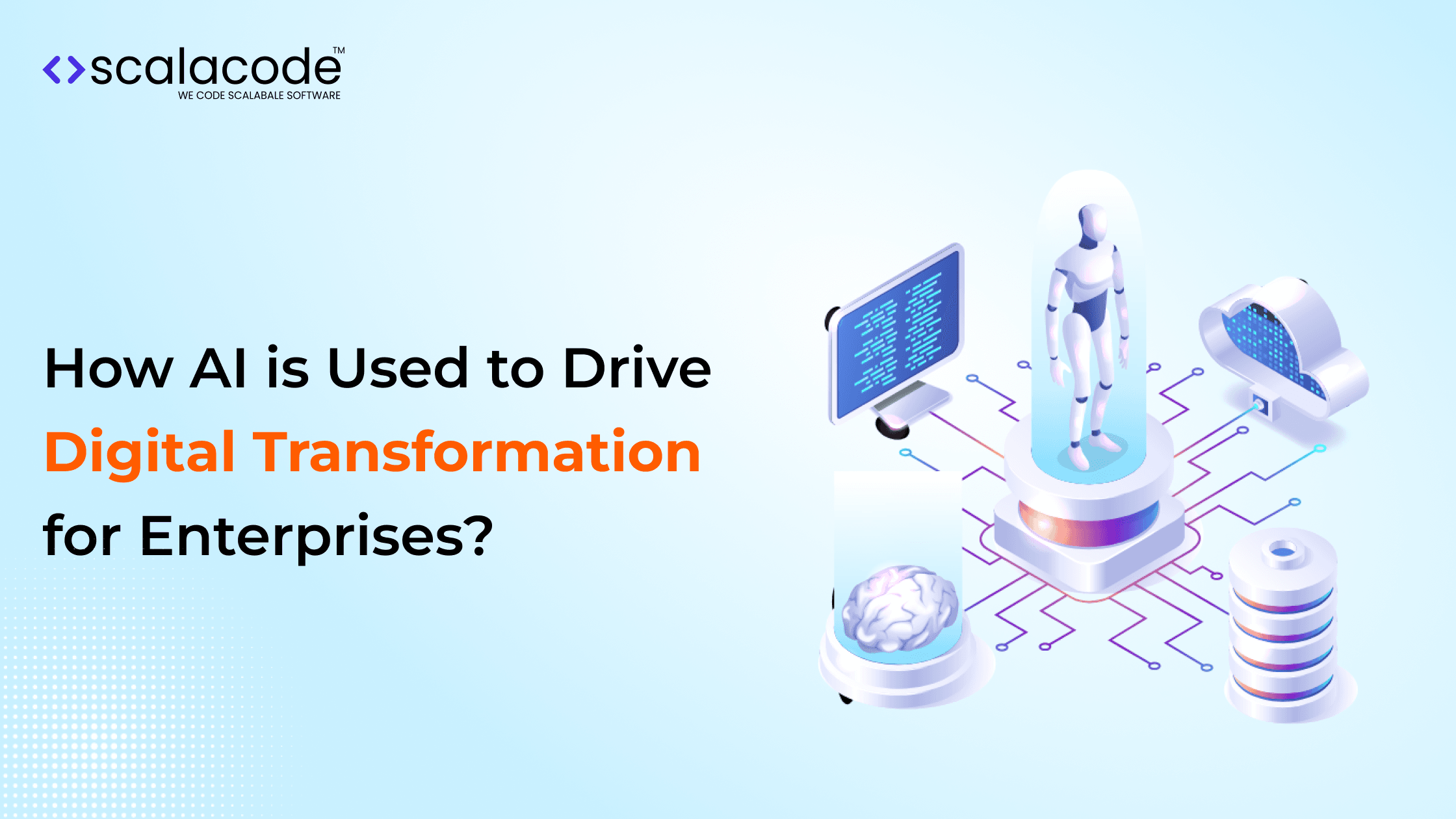The history of NFTs can be traced back to 2014. It was the time when the first known NFT- Quantum was developed by Kevin McCoy and Anil Dash.
With the passing years, in 2017, the NFT development services started to experience exponential growth. Many of the NFT projects were getting launched. The key factor that contributed to this growth was the introduction of the ERC-721 standard on the Ethereum platform.
However, the massive growth in the NFT market comes to the spotlight in 2020.
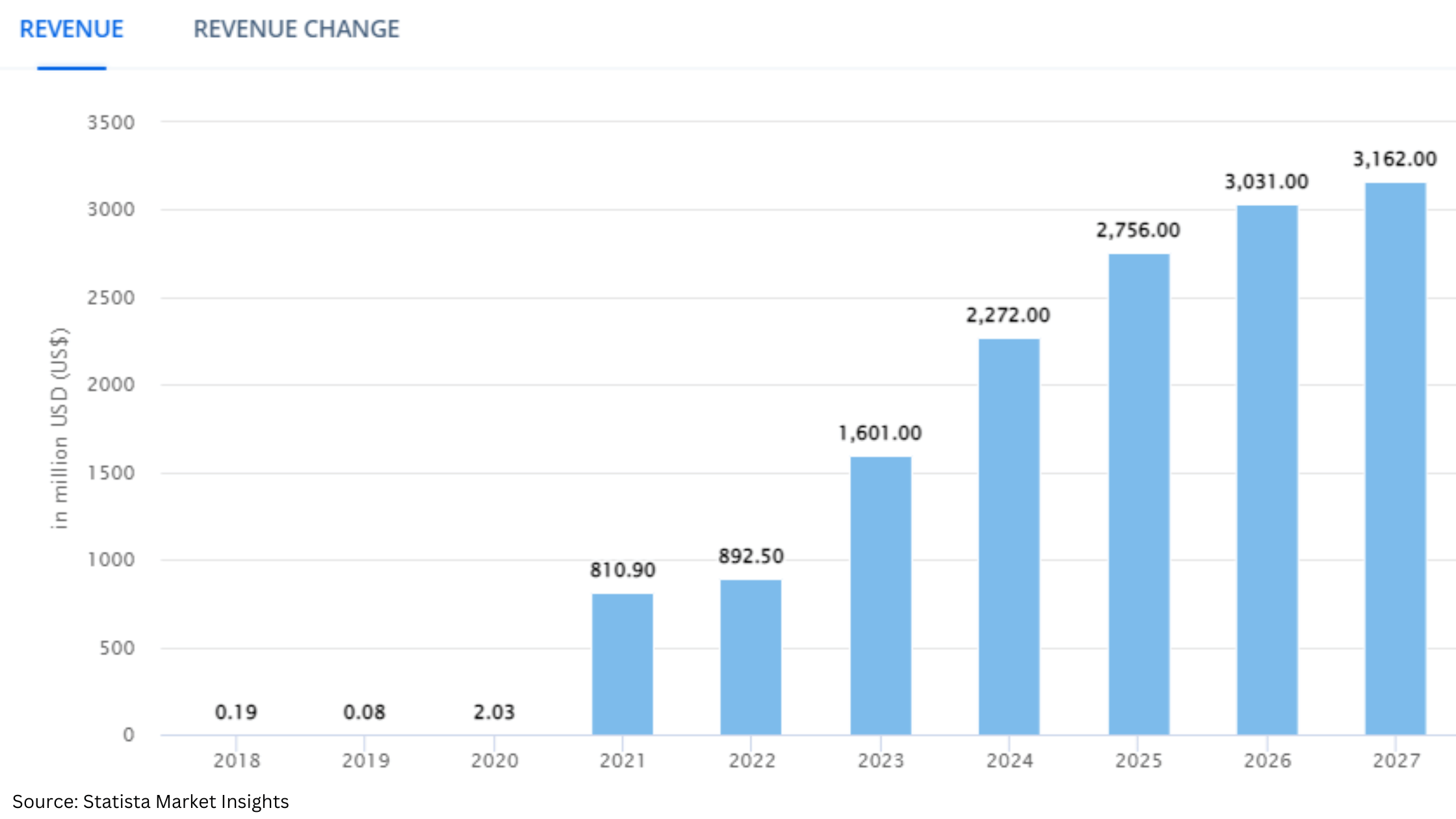 As per the Statista study, the revenue is expected to show an annual growth rate (CAGR 2023-2027) of 18.55% resulting in a projected total amount of US$3,162.00m by 2027.
As per the Statista study, the revenue is expected to show an annual growth rate (CAGR 2023-2027) of 18.55% resulting in a projected total amount of US$3,162.00m by 2027.
Furthermore, the Gartner 2022 Hype Cycle for Emerging Technologies places NFTs at the top of the “Peak of Inflated Expectations” curve.
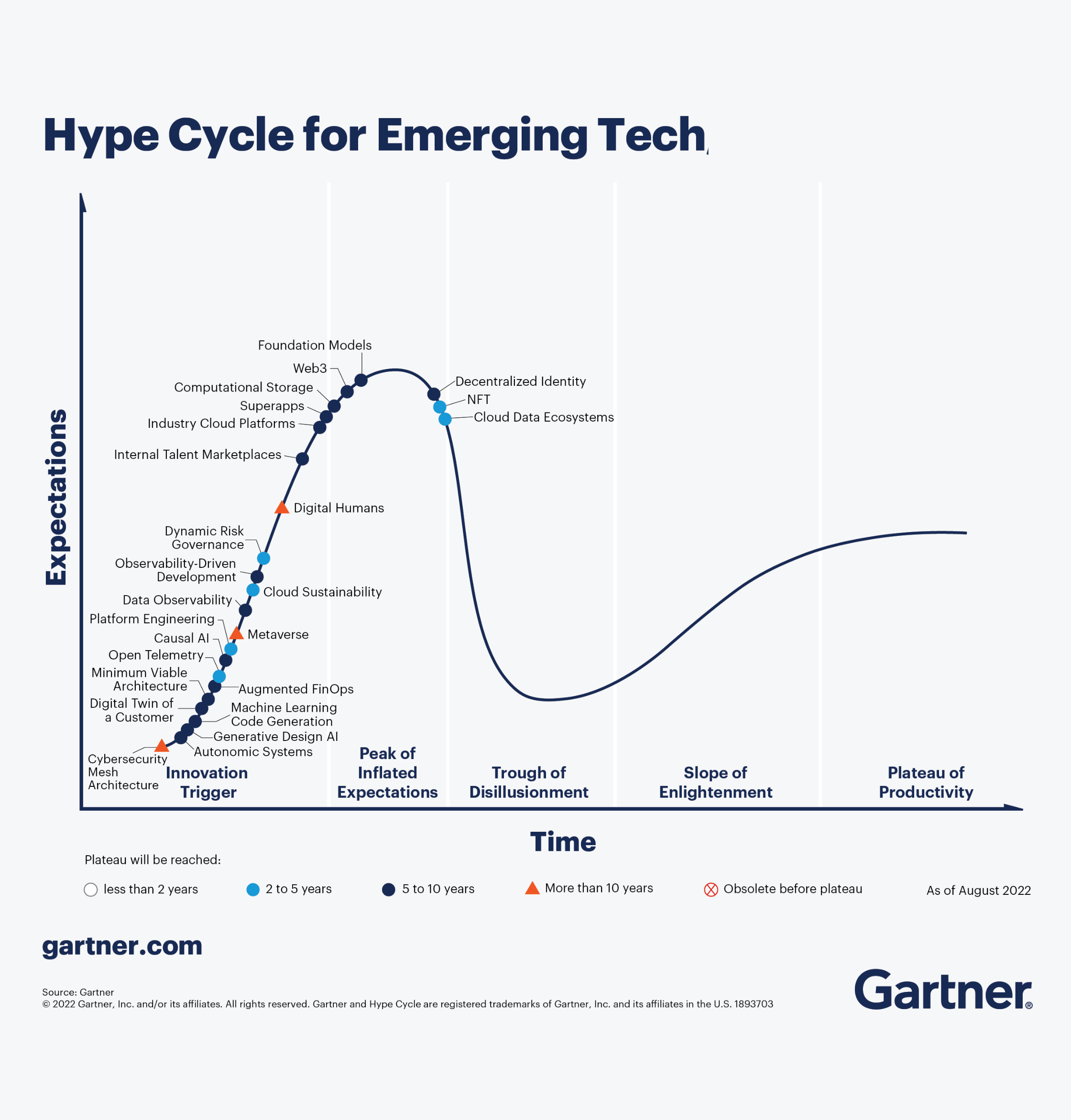 NFT development services are unquestionably gaining ground on the market and are seen as a game-changer for several industries. Many popular NFT marketplaces like OpenSea, Binance, SuperRare, and Nifty Gateway have emerged as dominant players in the industry.
NFT development services are unquestionably gaining ground on the market and are seen as a game-changer for several industries. Many popular NFT marketplaces like OpenSea, Binance, SuperRare, and Nifty Gateway have emerged as dominant players in the industry.
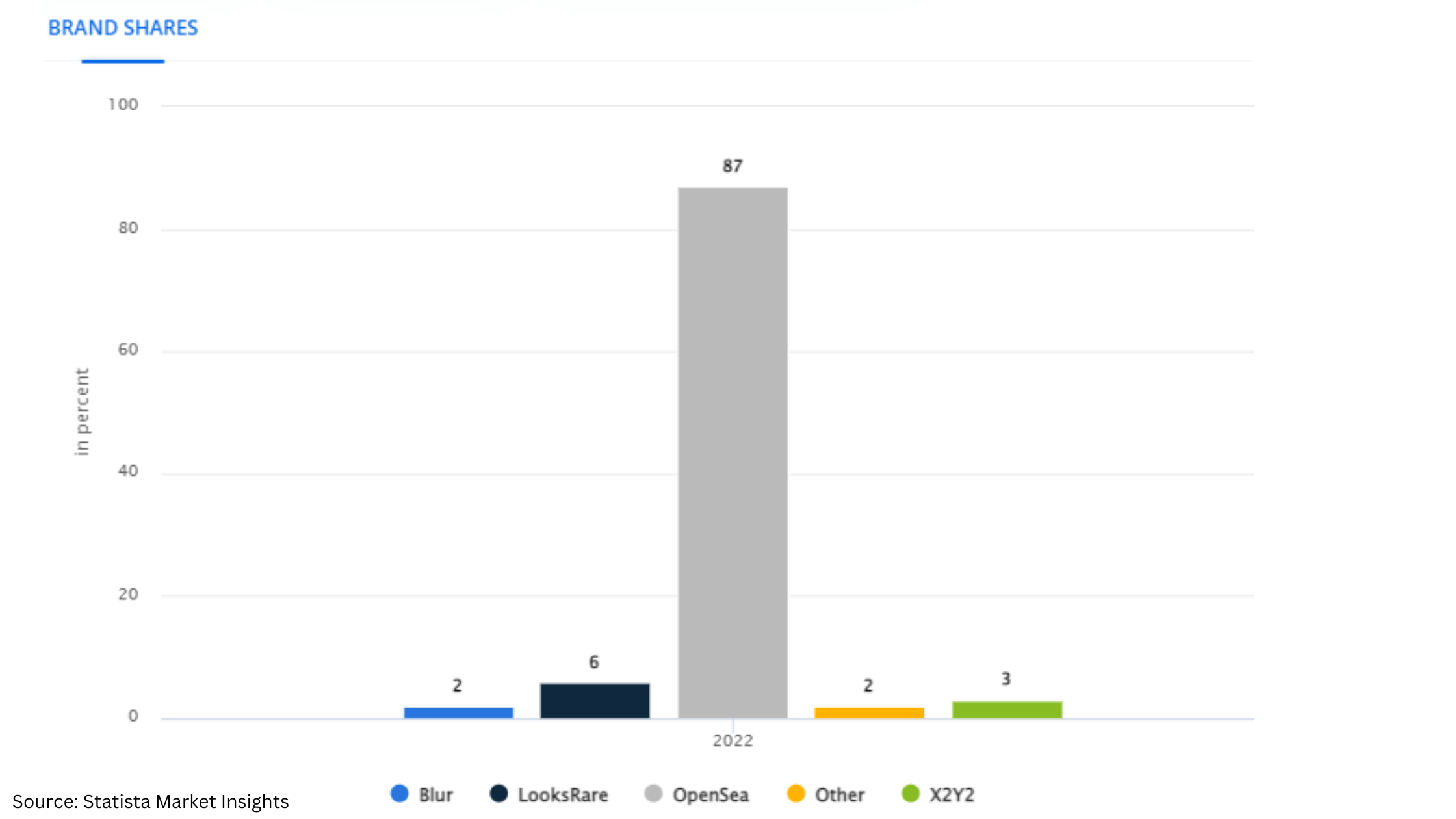 This growth has also led to an increase in the demand for NFT marketplace development. But what exactly is an NFT marketplace and how much does NFT marketplace development cost?
This growth has also led to an increase in the demand for NFT marketplace development. But what exactly is an NFT marketplace and how much does NFT marketplace development cost?
Let’s find out!
This piece of content will help you get insight into the details of this term and NFT marketplace development cost. So, keep reading this till the end.
What Is NFT Marketplace?
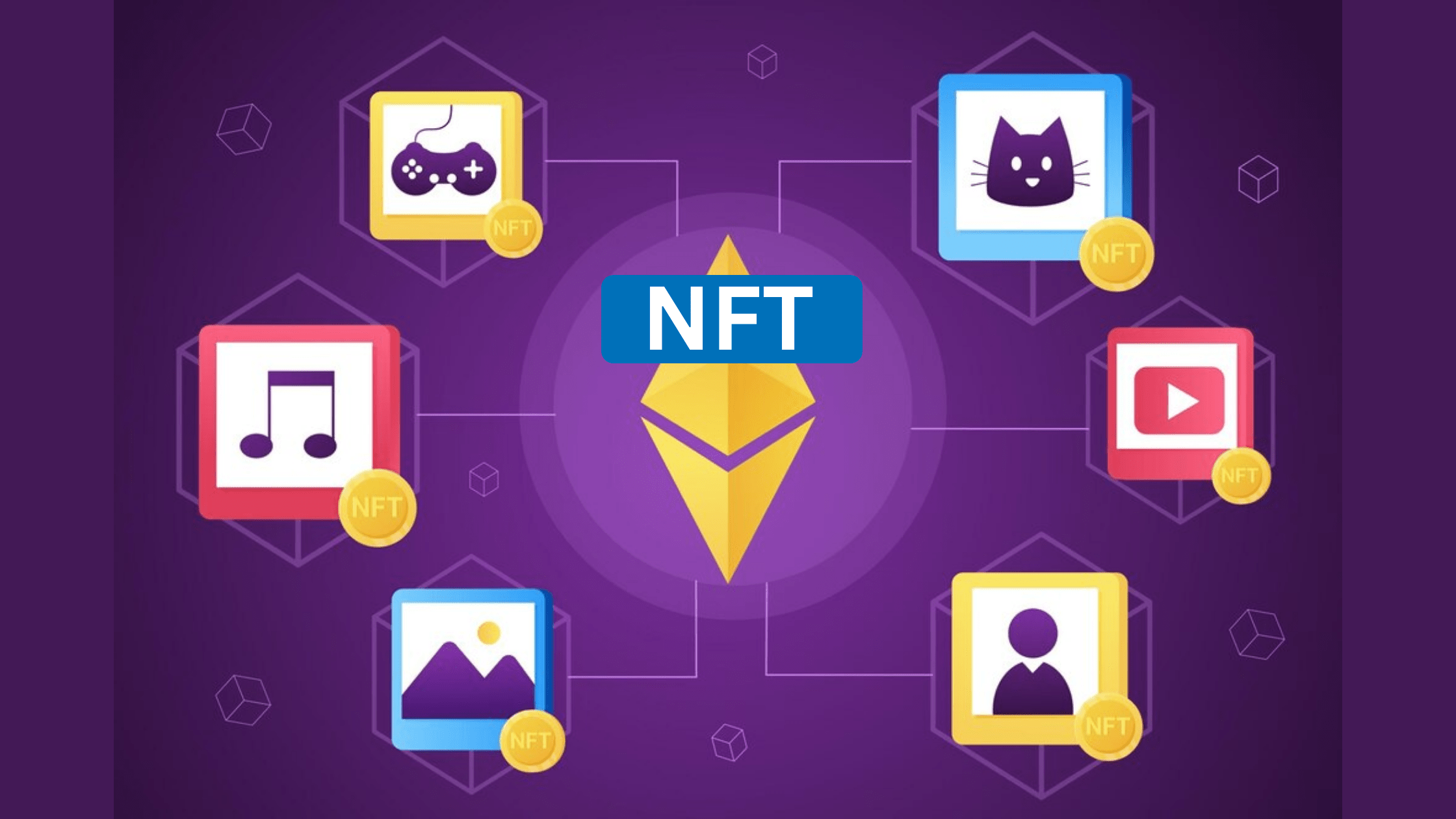
An NFT or a Non-Fungible Token is a digital asset that represents ownership of a unique item or piece of content. This item can be anything digital, like artwork, images, music, or even tweets. The best part, an NFT development company develops it uniquely, can’t be replicated, and is recorded on the blockchain.
NFTs, being a new and exciting phenomenon, have caught the attention of investors and businesspersons who are looking to enter this market. This has resulted in the development of NFT marketplaces.
NFT marketplaces are platforms that facilitate the buying and selling of NFTs. These marketplaces provide a place for creators and collectors to connect, sell and buy NFTs. It is an opportunity for them to monetize their digital creations in a new and exciting way.
How Does NFT Marketplace Work?
It all starts with creating an account in the NFT marketplace. It opens a door of endless possibilities for every user. From the moment you log in, you are welcomed into a dynamic environment where you can browse a plethora of unique NFTs available for sale. Many digital assets are available, ranging from dynamic GIFs and photographs to videos and even immersive virtual reality.
But that’s not all. With the power of blockchain, users can also mint their own NFTs, store and showcase them in their personalized profile, and connect with like-minded creators and enthusiasts. For anyone from digital artists to musicians to collectors, the NFT marketplace has an abundance of options to choose from.
Different Types of NFT Marketplaces
There are various types of NFT marketplaces that cater to different preferences and purposes. Here are some common types:
| NFT Marketplace Type | Description | Examples |
| General NFT Marketplaces | Support a wide range of NFT categories including digital art, collectibles, virtual real estate, music, videos, and more. | OpenSea, Rarible, SuperRare |
| Art NFT Marketplaces | Focus specifically on NFTs related to digital art and provide features tailored to artists and art enthusiasts. | Foundation, KnownOrigin, Async Art |
| Gaming NFT Marketplaces | Specialize in NFTs related to gaming, including in-game items, virtual land, and characters, and integrate with gaming ecosystems. | Axie Marketplace, NBA Top Shot, Decentraland Marketplace |
| Music NFT Marketplaces | Dedicated to NFTs related to music, such as albums, songs, concert tickets, and exclusive merchandise. | Audius, Mintbase, Zora |
| Domain NFT Marketplaces | Focus on NFTs representing domain names on the blockchain, allowing users to buy, sell, and trade unique domain names. | Unstoppable Domains, ENS (Ethereum Name Service), Handshake |
| Collectible NFT Marketplaces | Cater specifically to collectible NFTs, including trading cards, virtual pets, and limited-edition items, offering a platform for collectors to discover, trade, and showcase their collectibles. | CryptoKitties, NBA Top Shot, Bored Ape Yacht Club |
An additional way to differentiate NFT Marketplaces is through their exclusivity, general usage, and the targeted application.
| Type of NFT Marketplace | Description | Examples |
| General NFT Marketplace | A marketplace where users can buy and sell a wide range of NFTs without any restrictions | OpenSea, Magic Eden, ImmutableX |
| Specific NFT Marketplace | A marketplace that focuses on a particular niche, such as gaming, music, or art, making it easier for users to sell and trade assets within that niche | NBA Top Shot, Rarible, Async Art |
| Exclusive NFT Marketplace | A marketplace where unique and limited-edition NFTs are exclusively released in small quantities, making them highly valuable and accessible only to a select few users | SuperRare, Foundation, KnownOrigin |
NFT Marketplace Development Cost: A Quick Breakdown
Well, developing an NFT marketplace or availing of any NFT development services can be quite costly. The cost of developing an NFT marketplace can range from $50,000 to $300,000 or more. The cost depends on various factors like the features, functionality, complexity, and technology used in developing the platform.
Let’s have a quick overview of the NFT marketplace development cost:
Factors That Are Influencing The NFT Marketplace Development Costs
1. NFT Tech Stack Used
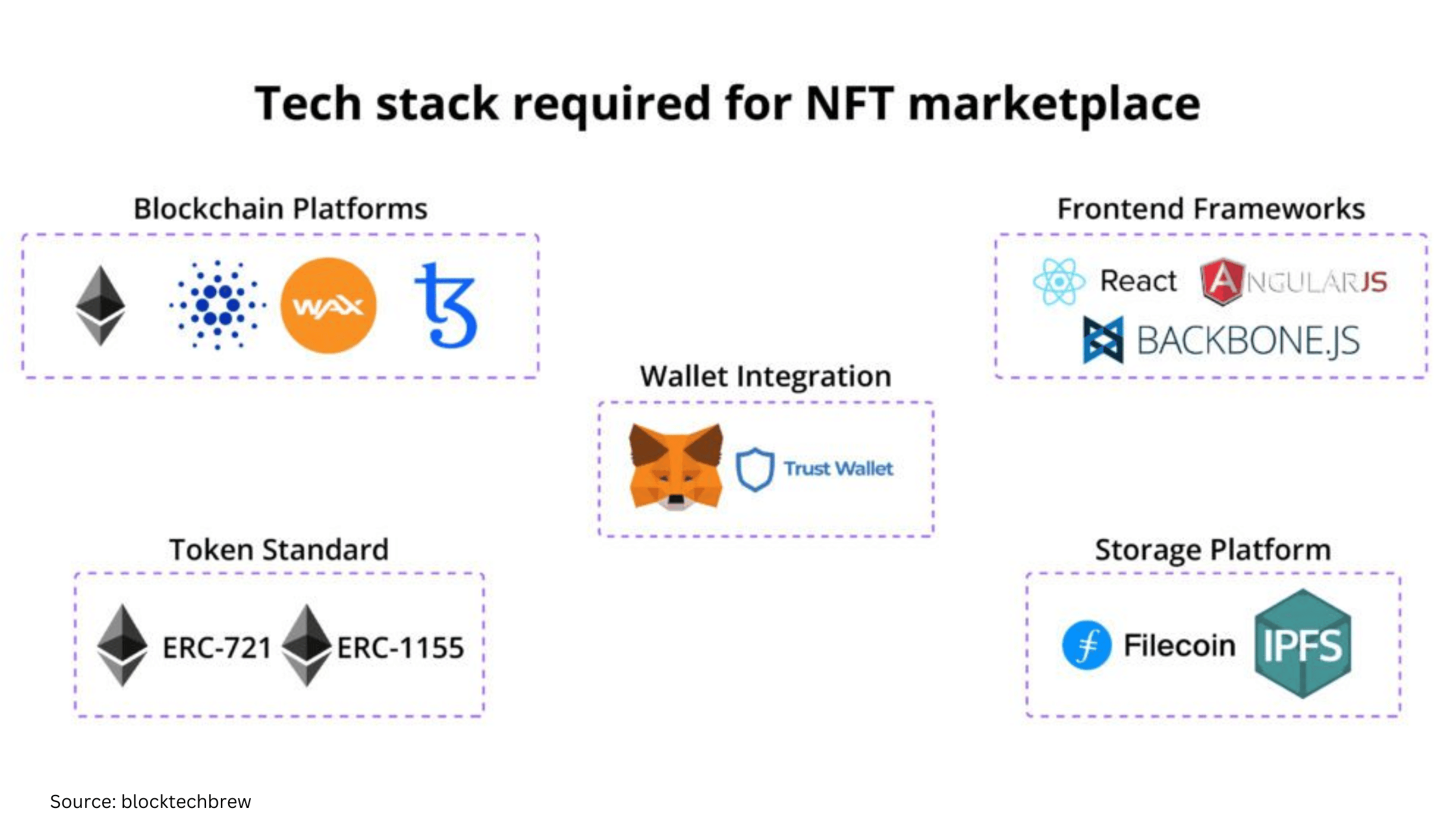
Developing a successful NFT marketplace largely depends on the technology stack used. The technology stack includes various frameworks, coding languages, databases, and tools that are used to build the application. In this section, we will explore blockchain development platforms, storage platforms, front-end and back-end development technologies, and NFT standards.
- Blockchain Platforms:
Various blockchain platforms are used for NFT marketplace development. Apart from Ethereum, other platforms like Binance Smart Chain, Solana, and Polkadot are also popular choices for their scalability and lower transaction fees.
- Storage Platforms:
In addition to IPFS, Pinata, and FileCoin, developers may utilize other storage platforms such as Arweave, Storj, or Sia for securely storing NFT data and ensuring accessibility.
- NFT Standards:
While ERC-1155 and ERC-721 are widely adopted NFT standards, there are others like NEP-11 (for the NEO blockchain) and TRC-721 (for the TRON blockchain). Developers choose the appropriate standard based on the blockchain they are using.
- Backend Frameworks:
For the backend development of NFT marketplaces, developers employ frameworks such as Node.js with Express, Django, Ruby on Rails, or Laravel. These frameworks provide robustness, scalability, and efficiency in handling the marketplace’s logic and database operations.
- Frontend Frameworks:
Tech stacks like Next.js: React, Vue, Bootstrap, etc. are commonly used for developing the frontend portion of the NFT marketplace.
By utilizing these technologies for NFT development services, blockchain developers can create feature-rich NFT marketplaces with seamless user experiences, efficient data storage, and secure transactions.
2. NFT Category Niche
The niche category of NFTs being developed can also affect the NFT marketplace development cost. NFTs based on high-value assets such as real estate or luxury goods may require additional security measures and legal compliance, resulting in higher development costs. On the other hand, NFTs based on digital art or gaming assets may have lower development costs due to the relatively simpler requirements.
| NFT Category Niche | Rough Development Cost |
| Gaming | $50,000 – $150,000 |
| Art-focused | $75,000 – $200,000 |
| Collectibles | $100,000 – $250,000 |
| Real Estate | $150,000 – $300,000 |
| Music | $70,000 – $250,000 |
3. Development Team
Another factor that can affect the cost of developing an NFT marketplace is the NFT development company you choose.
Whether it is about NFT in Smart Contract development or NFT Cryptocurrency development, a team with a proven track record and years of experience will cost more than a less experienced team.
A team with a proven track record and years of experience will cost more than a less experienced team.
Besides, the team composition for NFT marketplace development directly affects the cost. Factors like team size, expertise, specialized roles, and the decision between in-house or outsourcing impact the expenses.
Team Composition
- Project Manager
- Blockchain Developer
- Front-End Developer
- Back-End Developer
- UI/UX Designer
- Quality Assurance Specialist
Further, choosing an experienced team can provide significant benefits, including better project management, faster delivery times, and higher quality output.
4. Complexity of the Platform
When it comes to the factors affecting the NFT marketplace development cost, one factor that simply cannot be ignored is the complexity of the platform. An NFT marketplace that is easy to navigate, straightforward to use, and simple to understand is bound to be cheaper than one that is packed full of features, widgets, and tools.
As a seller, you might prefer a complex NFT marketplace with dozens of analytical tools, various ways to list your NFTs and detailed information about the latest market trends. But, for the most part, simpler is better. Buyers, too, tend to shy away from platforms that feel overwhelming or cluttered.
Hidden NFT Marketplace Development Cost
There are additional costs to consider beyond the initial NFT development services. These include:
- Server Costs: Expenses for hosting and maintaining the marketplace’s servers.
- Third-party Integration: Costs associated with integrating external services or APIs into the marketplace.
- Application Updates: Expenses related to regular updates and improvements to the marketplace.
- Bug Fixes: Budgeting for resolving software bugs and issues that may arise.
- Security Patches: Investing in measures to protect the marketplace from vulnerabilities and security threats.
- Marketing and promotion: This is an essential phase for the success of any NFT marketplace. Performing marketing and promotion activities may require additional resources and costs beyond the development phase.
Common Features In NFT Marketplace App
When developing an NFT marketplace app, the features you choose significantly influence the overall cost. However, here are some essential features to consider while developing such a solution:
- Storefront: A dashboard that provides users with information about NFTs, including details, owner, bids, and price history, enhancing customer engagement.
- Advanced search functionality: Support for category tagging and management, making it easier for users to find desired collectibles.
- Create listing: Sellers should have the ability to create listings and add details about their NFTs.
- Auction and buy: An efficient system that allows users to place bids, set expiration dates, and track bid status.
- Wallet integration: Integration of wallets for seamless NFT and cryptocurrency transactions, either through in-app wallets or integration with existing wallets.
- Instant notification: Real-time notifications through email and push notifications, providing updates on new collectibles, NFTs, and future auctions.
- Ratings: A reputation system for buyers and sellers, promoting trust and preventing negative behaviors.
To figure out NFT marketplace development cost in a more easy way, here is a rough cost breakdown for each stage.
The Breakdown of NFT Marketplace Development Cost
| Factor | Sub Section | Rough Estimation Costs (Approximately) |
| NFT Tech Stack Used | Blockchain Platform | $10,000 – $50,000 |
| Storage Platform | $5,000 – $20,000 | |
| NFT Standards | $2,000 – $10,000 | |
| Backend Framework | $10,000 – $40,000 | |
| Frontend Framework | $5,000 – $20,000 | |
| NFT Category Niche | Gaming | $50,000 – $150,000 |
| Art-focused | $75,000 – $200,000 | |
| Collectibles | $100,000 – $250,000 | |
| Real Estate | $150,000 – $300,000 | |
| Music | $70,000 – $250,000 | |
| Development Team | Project Manager | $8,000 – $15,000 |
| Blockchain Developer | $15,000 – $30,000 (per developer) | |
| Front-End Developer | $10,000 – $25,000 (per developer) | |
| Back-End Developer | $10,000 – $25,000 (per developer) | |
| UI/UX Designer | $8,000 – $15,000 | |
| Quality Assurance Specialist | $8,000 – $15,000 | |
| Complexity of the Platform | Basic Functionality | $20,000 – $50,000 |
| Moderate Complexity | $50,000 – $100,000 | |
| High Complexity | $100,000 – $200,000 | |
| Hidden Costs | Server Costs | $5,000 – $20,000 |
| Third-party Integration | $5,000 – $15,000 | |
| Application Updates | $5,000 – $15,000 (per update) | |
| Bug Fixes | $5,000 – $15,000 (per fix) | |
| Security Patches | $5,000 – $15,000 (per patch) | |
| Marketing and Promotion | $10,000 – $50,000 |
Note: It is only estimated roughly and may fluctuate based on several factors. For precise cost estimates that are customized to your unique project requirements, it is advisable to consult with specialized NFT marketplace development firms or experts.
How ScalaCode Can Help In the Development of the NFT Marketplace?
Entrepreneurs and business leaders are actively involved in using of Web3 technologies to shape the future of our world.
Web3 is centered around innovative applications of technology and is a combination of decentralized systems and blockchain technology.
The incredible potential of Web3 is set to revolutionize various industries. One of the most significant applications of Web3 is the non-fungible tokens or NFTs, which are leading the way in these disruptions. We, at ScalaCode, a leading NFT development company, help businesses in this domain,
We have a team of hardcore developers equipped with the latest tools and technologies to develop high-quality NFT development solutions. While working on such a project we take of everything that is required to make your project successful.
| Key Aspects | Description |
| Features and Functionalities | The number and complexity of features and functionalities required. |
| Integration Requirements | The need to integrate with external platforms or services. |
| Scalability and Performance | The ability to handle a large volume of users, transactions, or NFTs. |
| Customizations and Design | The level of customization and complexity in design elements. |
| Security and Compliance | Implementing robust security measures and ensuring regulatory compliance |
Parting Words On NFT Marketplace Development Cost!
Over the years, NFTs have gained traction and popularity as artists, musicians, and influencers began to recognize their potential as a new revenue stream and a way to monetize digital content. With the rise of NFT marketplaces, buying and selling these unique tokens has become more accessible than ever before.
However, giving the exact figure about the NFT marketplace development cost is tough. And that we have discussed in the above section. It completely depends on your requirements.
For example, an NFT marketplace can be developed from scratch or using existing NFT marketplace software.
Developing an NFT marketplace from scratch will be more expensive than using an existing NFT marketplace software as it involves more work and time.
Moreover, using existing software might not be able to provide the customizability and uniqueness that some business owners are looking for.
The cost of developing an NFT marketplace on Ethereum will be different from the cost of developing it on other blockchain networks like Polkadot or Solana.
Therefore, it is important to research the market, know your requirements, and then reach out to a professional NFT development company like ours. You can even talk to us to get the consultation and quote.
FAQs:
How do I start an NFT marketplace development project?
Starting an NFT marketplace requires a complex set of skills and knowledge of blockchain technology. So, you will need to hire NFT developers and designers who can create a secure and user-friendly platform that can handle NFT transactions. Besides, it is also important that you have a deep understanding of this market and the legal aspects related to NFTs.
How much does NFT marketplace development cost?
It can cost you somewhere between $50,000 and $3,000,000, depending on the request you make to the NFT marketplace development company. This means the cost will vary depending on the requirements and features that you want in your project.
Which is the best NFT marketplace development company?
Unfortunately, pointing out one as the best is difficult. However, to avail top-notch coding, UI/UX design, project management, and other services, you can contact us. We are a reputed NFT marketplace development company, serving clients worldwide for over a decade.
How much does NFT design cost?
Designing is one of the factors that determine the cost of your NFT marketplace. The UI/UX designer may cost you somewhere between $8,000 and $15,000 for the complete design section, from creating the wireframe to the final product.
How much time does it take to develop an NFT app?
Well, before knowing the exact requirements of the project, it is tough to give an exact time frame. However, on average, it takes somewhere between 2 and 4 months to develop an NFT app.
How long will NFT take to dominate the cryptocurrency market?
The NFT market is still in its early, but the potential is immense. As per the reports, the market is expected to:
| Report Attribute | Details |
| Forecast Period | 2023 – 2030 |
| Estimated Market Value (USD) in 2023 | $95024.6 Million |
| Forecasted Market Value (USD) by 2030 | $769930.1 Million |
| Compound annual growth rate | 34.8 % |
What can I tokenize for NFT?
Almost any type of digital asset can be tokenized to NFT, such as digital art, music, videos, images, tweets, and more.
Why are NFTs getting popular?
The main reasons for NFT’s popularity are:
- The growing demand for digital art worldwide
- Improved transactions and increased security
Can NFTs be copied?
No, it can’t be copied. This is due to their unique code and blockchain technology. Each NFT is stored on a decentralized network, making it impossible to replicate or forge.
